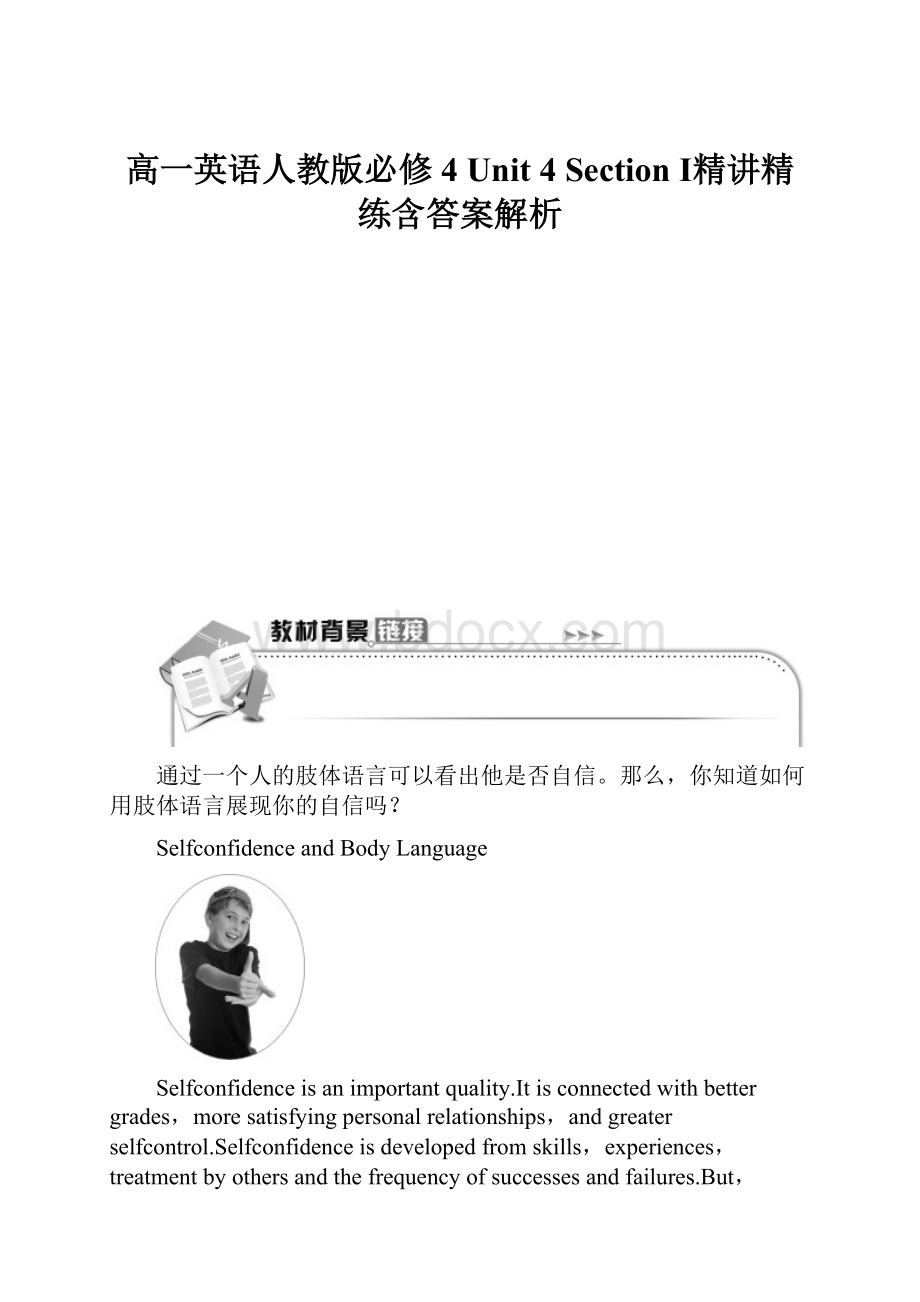 高一英语人教版必修4 Unit 4 Section Ⅰ精讲精练含答案解析.docx
高一英语人教版必修4 Unit 4 Section Ⅰ精讲精练含答案解析.docx
- 文档编号:9572473
- 上传时间:2023-02-05
- 格式:DOCX
- 页数:24
- 大小:167.15KB
高一英语人教版必修4 Unit 4 Section Ⅰ精讲精练含答案解析.docx
《高一英语人教版必修4 Unit 4 Section Ⅰ精讲精练含答案解析.docx》由会员分享,可在线阅读,更多相关《高一英语人教版必修4 Unit 4 Section Ⅰ精讲精练含答案解析.docx(24页珍藏版)》请在冰豆网上搜索。

高一英语人教版必修4Unit4SectionⅠ精讲精练含答案解析
通过一个人的肢体语言可以看出他是否自信。
那么,你知道如何用肢体语言展现你的自信吗?
Self confidenceandBodyLanguage
Selfconfidenceisanimportantquality.Itisconnectedwithbettergrades,moresatisfyingpersonalrelationships,andgreaterselfcontrol.Selfconfidenceisdevelopedfromskills,experiences,treatmentbyothersandthefrequencyofsuccessesandfailures.But,selfconfidenceisalsoaffectedbysomethingassimpleashowyoucarryyourselfasyougoaboutyourdailylives.Ifyoubehavemoreselfconfidently,youfeelmoreself confident.Herearesomedirectinstructionsthatwillhelpyouachieveit.
Tostartwith,standtallandstraightwithyourshouldersback.Thisisparticularlyimportantforteenagegirls.Theywillneedtobalancebeingconfidentintheirbodieswhilelearningtodealwithinappropriate(不当的)reactionstheygetfromsomepeople.
Self confidentpeoplestandandwalkwiththeirhandsoutandtothesideofthebody.Someinterestingresearchhasprovidedevidencethatplacingyourhandsonyourhips(臀部)resultsingreaterconfidenceanddecisivenessinbusinesssituations.Thisissometimesreferredtoasthesuperheroposture.Beforeyouareabouttojoininanactivitywhereselfconfidenceisrequired,standlikeasuperherowithyourheadheldhigh,youreyesfocusedonthehorizon(地平线)andyourhandsonyourhips.Itcanfeelkindofsillybutwillmakeadifferenceinyourattitudeandbehavior.
Finally,youneedtoknowhowyouactuallywalk.Self confidentpeoplewalkwithapurposefulstride(大步).Theytakesolidstepswiththeirheadup,lookingwheretheyaregoingandmakingdirecteyecontact(接触)withpeopletheymeet.
Withalittletimeandsomedirectinstructions,youcanappearmoreselfconfidentwhichwillactuallyhelpyoufeelmoreselfconfident.Onethingthough,itisprobablybettertopracticethisinprivate.
SectionⅠ WarmingUp&Reading—Comprehending
1.approachvt.&vi. 接近;靠近;走近
n.接近;方法;途径
2.cheekn.面颊
3.majoradj.主要的
4.adultn.成人;成年人
adj.成人的;成熟的
5.dashvi.猛冲;突进
6.likelyadj.可能的→unlikelyadj.不可能的
7.statementn.陈述;说明→statev.陈述;说明
8.greetvi.&vt.迎接;问候→greetingn.迎接;问候;招呼
9.representvt.代表;象征→representationn.代表,代表团;代理→representativeadj.代表性的n.代表,代理人
10.associationn.社团;联系;联想→associatev.把……联系起来
11.curiousadj.好奇的→curiouslyadv.好奇地→curiosityn.好奇心
12.defendvt.保护;保卫→defencen.防御;保卫
13.misunderstandvt.误解;误会→misunderstandingn.误解;误会
[构词法:
mis否定前缀,常见词:
mistrustvt.不信任;misreportvt.误报;misspellvt.拼写错]
14.spokenadj.口语的→unspokenadj.未说出口的;非口语的
15.simplyadv.简单地;只→simpleadj.简单的;单纯的;天真的
1.put__up举起;抬起
2.in__defence保卫;防御
3.kiss__sb.on__the__cheek吻某人的脸
4.be__likely__to很可能……;有希望……
5.in__general总的来说;通常
6.defend...against防御;保卫……以免受
1.thefirsttodo...结构
The__first__person__to__arrive(第一个到达的人)wasTonyGarciafromColombia,closelyfollowedbyJuliaSmithfromBritain.
2.状语从句的省略结构
Shesteppedbackappearingsurprisedandputupherhands,as__if__in__defence(好像是在自卫).
3.notall...表示部分否定
Not__all__cultures(并不是所有文化)greeteachotherthesameway,noraretheycomfortableinthesamewaywithtouchingordistancebetweenpeople.
Fast reading
Skimthetextandanswerthefollowingquestions.
1.Whatdoesthetextmainlytalkabout?
A.Communication. B.Spokenlanguage.
C.Bodylanguage.D.Differentcultures.
答案:
C
2.Matchthemainideaofeachparagraph.
Para.1 A.Tosuggeststudyinginternationalcustoms.
Paras.2-3B.TomeettheinternationalstudentsattheCapitalInternationalAirport.
Para.4C.Tointroducethestudentstoeachotherandexplaintheirdifferentwaysof
greeting.
Para.5D.Toexplaindifferentcultural“bodylanguage”insomecountries.
答案:
BCDA
Careful reading
Readthetextcarefullyandchoosethebestanswer.
1.Inwhichofthefollowingcountriesdopeoplegreeteachotherinthesameway?
A.ColombiaandBritain.
B.SpainandItaly.
C.FranceandJordan.
D.ChinaandJapan.
2.Howdoesthetextdevelop?
A.Bygivingexamples.
B.Bygivingdata.
C.Bygivingdefinition.
D.Bymakingcomparisons.
3.What’sthepurposeofthesecondparagraph?
A.Togiveexamplesofmistakestheinternationalstudentsmake.
B.Togiveexamplesofculturaldifferencesinbodylanguage.
C.Toshowhowsurprisedwearebytheirdifferentbehavior.
D.Toshowhowimportantbodylanguageis.
4.Whatcanwelearnfromthepassage?
A.Nevertoooldtolearn.
B.WheninRome,doastheRomansdo.
C.Foureyesseemorethantwo.
D.Everycountryhasitsowncustoms.
答案:
1-4.BABB
Study reading
Analyzethefollowingdifficultsentencesinthetext.
1.Yesterday,anotherstudentandI,representingouruniversity’sstudentassociation,wenttotheCapitalInternationalAirporttomeetthisyear’sinternationalstudents.
[尝试翻译]
________________________________________________________________________
答案:
昨天,我和另外一个同学代表我们大学的学生会去首都国际机场迎接今年的留学生。
2.Afterhalfanhourofwaitingfortheirflighttoarrive,Isawseveralyoungpeopleenterthewaitingarealookingaroundcuriously.
[尝试翻译]
________________________________________________________________________
答案:
在等了他们的航班半个小时后,我看见几个年轻人走进了等候区,好奇地张望。
3.Theyshookhandsandthenkissedeachothertwiceoneachcheek,sincethatistheFrenchcustomwhenadultsmeetpeopletheyknow.
[尝试翻译]
________________________________________________________________________
答案:
他们握了握手,并且在对方的面颊上吻了两下,因为法国成年人见到熟人就是这么做的。
4.Mostpeoplearoundtheworldnowgreeteachotherbyshakinghands,butsomeculturesuseothergreetingsaswell,suchastheJapanese,whoprefertobow.
第一个分句:
but
第二个分句:
[尝试翻译]
________________________________________________________________________
答案:
现在世界上大多数人见面要握手相互问候,但有些文化(背景下的人)会采取另外一些寒暄方式。
比方说,日本人就更愿意鞠躬。
COMMUNICATION:
NOPROBLEM①?
Yesterday,anotherstudentandI,representing②ouruniversity’sstudentassociation③,wenttotheCapitalInternationalAirporttomeetthisyear’sinternationalstudents.TheywerecomingtostudyatBeijingUniversity.Wewouldtakethemfirsttotheirdormitories④andthentothestudentcanteen⑤.Afterhalfanhourofwaitingfortheirflight⑥toarrive,Isawseveralyoungpeopleenterthewaitingarealookingaroundcuriously⑦.Istoodforaminutewatchingthem⑧andthenwenttogreetthem.
Thefirstpersontoarrive⑨wasTonyGarciafromColombia⑩,closelyfollowedbyJuliaSmithfromBritain⑪.AfterImetthemandthenintroducedthemtoeachother,Iwasverysurprised.Tonyapproached⑫Julia,touchedhershoulderandkissedheronthecheek⑬!
Shesteppedbackappearingsurprised⑭andputupherhands,asifindefence⑮.Iguessedthattherewasprobablyamajor⑯misunderstanding⑰.ThenAkiraNagatafromJapancameinsmiling,togetherwithGeorgeCookfromCanada.Astheywereintroduced,Georgereachedhishandoutto⑱theJapanesestudent.Justatthatmoment,however,AkirabowedsohisnosetouchedGeorge’smovinghand.Theybothapologized—anotherculturalmistake!
AhmedAziz,anotherinternationalstudent,wasfromJordan⑲.Whenwemetyesterday,hemovedveryclosetomeasIintroducedmyself.Imovedbackabit,buthecameclosertoaskaquestionandthenshookmyhand.WhenDarleneCoulonfromFrancecamedashingthroughthedoor⑳,sherecognizedTonyGarcia’ssmilingface
.Theyshookhands
andthenkissedeachothertwiceoneachcheek,sincethatistheFrenchcustomwhenadults
meetpeopletheyknow.AhmedAziz,onthecontrary
,simply
noddedatthegirls.MenfromMiddleEasternandotherMuslim
countrieswilloftenstandquitecloseto
othermentotalkbutwillusuallynottouchwomen.
AsIgettoknow
moreinternationalfriends,Ilearnmoreaboutthiscultural“bodylanguage”.Notall
culturesgreeteachotherthesameway,noraretheycomfortable
inthesamewaywithtouchingordistancebetweenpeople.Inthesamewaythatpeoplecommunicatewithspokenlanguage,theyalsoexpresstheirfeelingsusingunspoken“language”
throughphysicaldistance,actionsorposture
.Englishpeople,forexample,donotusuallystandveryclosetoothersortouchstrangersassoonastheymeet.However,peoplefromplaceslikeSpain
,Italy
orSouthAmericancountriesapproachotherscloselyandaremorelikelyto
touchthem.Mostpeoplearoundtheworldnowgreeteachotherbyshakinghands,butsomeculturesuseothergreetingsaswell
,suchastheJapanese,whoprefertobow.
Theseactionsarenotgoodorbad,butaresimply
waysinwhichcultureshavedeveloped
.Ihaveseen,however,thatculturalcustomsforbodylanguageareverygeneral—notallmembersofaculturebehaveinthesameway.Ingeneral
,though
,studyinginternationalcustoms
cancertainlyhelpavoiddifficultiesintoday’sworldofculturalcrossroads
!
①noproblem用来回答别人的道歉或致谢,意为“没什么,不客气,没关系”;若表示乐于相助或事情容易做到,则意为“没问题”。
②represent[ˌreprI'zent]vt.代表;象征
③association[əˌsəʊsI'eIʃn]n.社团;联系;联想
NBA中的A就是association的缩写。
现在分词短语representingouruniversity’sstudentassociation作定语,前后有逗号隔开时,相当于一个非限制性定语从句。
④dormitory['dɔːmItrI]n.宿舍
⑤canteen[kæn'tiːn]n.食堂
⑥flight[flaIt]n.飞行;航班
⑦curiously['kjʊərIəslI]adv.好奇地
curious['kjʊərIəs]adj.好奇的
现在分词短语lookingaroundcuriously作伴随状语。
⑧现在分词短语watchingthem作伴随状语。
⑨动词不定式toarrive作定语,被修饰词thefirstperson与它是主动关系。
⑩Colombia[kə'lʌmbIə]n.哥伦比亚(南美洲国家)
⑪过去分词短语closelyfollowedbyJuliaSmithfromBritain作定语,相当于非限制性定语从句whowascloselyfollowed...。
⑫approach[ə'prəʊtʃ]vt.&vi.接近;靠近;走近n.接近;方法;途径
⑬kisssb.onthecheek亲吻某人的脸颊
cheek[tʃiːk]n.面颊
⑭现在分词短语appearingsurprised作伴随状语。
⑮indefence(of)保护;为了保卫;(为……)辩护
defence[dI'fens]n.防御;保卫
defend[dI'fend]vt.保护;保卫
⑯major['meIdʒə]adj.主要的;重要的;大的
⑰misunderstandingn.误解;误会
misunderstand[ˌmIsʌndə'stænd]vt.误解;误会
⑱reachone’shandouttosb.向某人伸出手
reachouttosb.愿意提供援助
⑲Jordan['dʒɔːdn]n.约旦(西亚国家)
⑳dash[dæʃ]vi.猛冲;突进
现在分词短语dashingthroughthedoor作方式状语,修饰came。
smilingface中的smiling是v.ing形式作face的定语。
shakehands握手
- 配套讲稿:
如PPT文件的首页显示word图标,表示该PPT已包含配套word讲稿。双击word图标可打开word文档。
- 特殊限制:
部分文档作品中含有的国旗、国徽等图片,仅作为作品整体效果示例展示,禁止商用。设计者仅对作品中独创性部分享有著作权。
- 关 键 词:
- 高一英语人教版必修4 Unit Section 精讲精练含答案解析 英语 人教版 必修 精练 答案 解析
 冰豆网所有资源均是用户自行上传分享,仅供网友学习交流,未经上传用户书面授权,请勿作他用。
冰豆网所有资源均是用户自行上传分享,仅供网友学习交流,未经上传用户书面授权,请勿作他用。


 《JAVA编程基础》课程标准软件16级.docx
《JAVA编程基础》课程标准软件16级.docx
